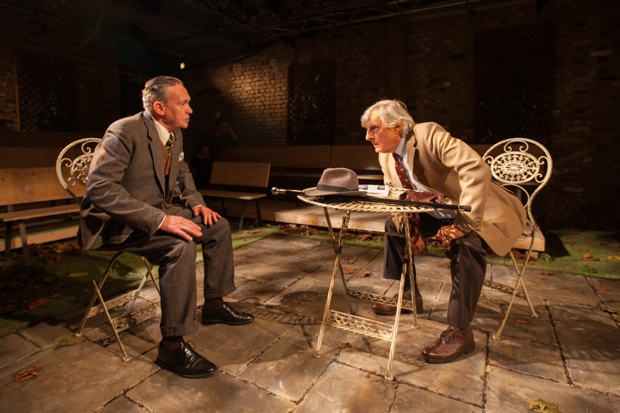Here’s a tip for play-goers. When the curtain goes up on a garden, prepare for some feeble plotting. The glory of gardens, for the playwright, is that the characters can enter and leave without reason. The rites of welcome and valediction, the physical opening and shutting of doors, the declaration of motive are all abandoned. Anyone can wander in and out of a backyard. But that freedom of action is denied to a character who enters, say, a palace or a travel agents or a bedroom.
Shaw is fond of gardens. Ayckbourn quite likes them too. Shakespeare used them more than once (but he’s forgiven) and David Storey sets his 1970 classic Home in a garden where two elderly bores bump into each other on a warm autumn day. They seem to be acquainted. They exchange meandering chit-chat, which deepens the uncertainty about where they are. Two sexless crones appear. With pathetic brashness, they attempt to flirt with the grey old twaddlers. Someone goes stumbling off in search of a spare chair. After more unanchored witter, a bearded maniac appears and honks abuse at the ladies while twirling garden furniture over his head. They treat his behaviour as normal. At which point the penny drops. We’re in a mental asylum. The wafer-thin banter continues and the old gits start to babble about their spurious connections with royalty and their sorrow over Britain’s loss of status.
The play turns out to be a formula. Dementia, barren lust and impotent rhetoric stand for the decline of our former colonial magnificence. These days, the whole thing seems contrived, aimless and obscure and yet when the script first appeared it secured the services of Gielgud and Richardson in the lead roles. It hopped from the Royal Court to the West End and then on to Broadway. Revivals have been infrequent since because its themes no longer resonate with the public. Good thing too. In the 1960s and 1970s the country was crammed with ageing curmudgeons who’d ‘done their bit’ during the war and didn’t like the way Britain was shaping up. These mothballed bile-mongers had only to see a hippie dropping a crisp bag and they’d call up the local radio phone-in and start frothing at the gills about Britain’s descent into indiscipline, squalor and soaplessness. They even had a catchphrase. ‘This isn’t why I fought the Germans!’ Their gloom-tinged rage was opposed by progressive types, like Storey, who argued for a more relaxed attitude to our post-colonial future. But to anyone born after about 1950, the debate over Britain-minus-its-empire meant absolutely sod-all. What empire? We couldn’t miss what was never ours. And this play is the final spasm of a dying impulse. That explains why the script is shot through with frailties, from the listless symbolism to the enfeebled rhetoric and the absence of narrative interest.
That said, this production is conspicuously well done. Naomi Dawson’s elegant, sepia-toned design captures the autumnal mood superbly. And the cast, led by the quietly forceful Jack Shepherd, do their best to bring a measure of substance to the script’s jabbering puppets. By the end, one feels the victim of a prank played by a writer who has to perpetuate a falsehood in order to pull off his swindle. None of the characters, apart from the chair-twirling loon who appears late on, shows any sign of mental impairment. Without that inconsistency, the play couldn’t function at all.
At the Print Room, less than a mile from Harold Pinter’s home, there’s a revival of one of his earliest plays. The Dumb Waiter offers ample scope for misinterpretation and this assured production by Jamie Glover avoids the most obvious elephant trap. He refuses to treat it as a comedy. The two killers lounging in the basement are the genuine article: a pair of paranoid, cold-eyed thugs. As they await their orders their conversation is disturbed by a dumb waiter, descending from a central chute, which carries requests for cooked dishes whose rancid names, ‘liver and onion’, ‘sago pudding’, savour of post-war austerity. The central gag doesn’t survive much scrutiny. How come the staff at the upstairs restaurant don’t know their kitchen has been decommissioned? Never mind.
The collision between the killers’ brutality and their frantic efforts to obey the requests arriving from on high is reliably enjoyable. And Pinter’s dialogue still carries a hypnotic charge. The younger thug recalls killing a young girl and expresses his disgust at the way her dying body ‘spread’. The commonplace word acquires an extra loading of horror from its sheer mundanity. This is an expert production of a tricky, experimental play. And it releases the audience by 8.45 p.m.,
which leaves plenty of time for dinner and a rewarding discussion about Pinter and the poetry of menace. Hopefully over tastier fare than liver and onions and sago pud.







Comments